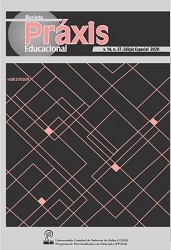POTENCIAL EDUCATIVO DE LAS TECNOLOGÍAS DE LA INFORMACIÓN Y LA COMUNICACIÓN EN LA EDUCACIÓN PATRIÓTICA DE LOS ESTUDIANTES
DOI:
https://doi.org/10.22481/praxisedu.v16i37.6404Palabras clave:
Tecnologías de la información y la comunicación, Educación patriótica, Instituciones educativas, Desarrollo innovadorResumen
El potencial educativo de las tecnologías de la información y la comunicación en la educación patriótica de los estudiantes se investiga y confirma en el artículo. Llevando a cabo un experimento pedagógico, se ha comprobado teóricamente y prácticamente ha demostrado la eficacia del uso de tecnologías de información y comunicación en la educación patriótica de los estudiantes. Se analiza la experiencia de trabajo de las instituciones de educación secundaria en educación patriótica, se seleccionan e implementan métodos de diagnóstico para estudiar el nivel de educación patriótica de los estudiantes en instituciones de educación secundaria general. Se confirma el conjunto de métodos de diagnóstico aplicados destinados a revelar el potencial educativo de las tecnologías de la información y la comunicación en la educación patriótica de los estudiantes. También hemos elaborado el sistema de indicadores de calidad de los principales componentes de la educación y los criterios patrióticos. Basado en el análisis de la literatura psicológica y pedagógica y el estudio de las ideas de los científicos, cuatro niveles de educación patriótica han sido científicamente fundamentados por ciertos criterios e indicadores. Se lleva a cabo la escala de los criterios correspondientes de los indicadores teniendo en cuenta los indicadores de su aparición en 0-3 puntos.
Descargas
Métricas
Citas
Bukanov H., Kolesnyk A., Tashkinova O., Kotlubai V., Koval V. (2019). Social marketing in public administration of social service institutions. Revista Genero & Direito, 8 (6), 457-468.
Chace, J. (1997). An Extraordinary Partnership. Marshall and Acheson, 76, 191-194.
Chernega, P. (2012). Ukrainian ethnopedagogy - the science of the content, principles and methods of folk pedagogy of Ukrainians. The main directions of formation of professional qualities of specialists in educational work in the armed forces of Ukraine, 4, 65-67
Cichosz, W. (2013). Możliwości dialogu wychowania chrześcijańskiego ze współczesną edukacją polską. Wydawnictwo „Bernardinum”, Pelplin.
Demyanchuk, A. (2019). Psychological and pedagogical features of patriotism formation in senior preschoolers. Psychological and pedagogical bases of humanization of educational process in school and high school, 1, 13-20.
Dukhnovich, A. (2009). Folk pedagogy in favor of scientists and teachers. M.: Pedagogy.
Frączek, Z. (2006). Ojczyzna jako wartość edukacyjna w obliczu integracji europejskiej. in: Janiga W. (ed). Wychowanie do patriotyzmu. Przemyśl–Rzeszów, 3, 457–463.
George, F. (1946). "Long Telegram". The Makings of America: The United States and the World, 2, 299-303.
Goncharenko, C. (1997). Ukrainian Pedagogical Dictionary, 1, 34-36.
Janiga, W. (2004), Wychowanie patriotyczne dzieci i młodzieży w świetle dyrektorium katechetycznego i podstawy programowej katechezy kościoła katolickiego w Polsce. Resovia Sacra, 11, 213-225.
Kapska, A. (2001). Actual problems of social and pedagogical work (modular course of distance learning): Educ. Tool, 5, 119-129.
Koval, V., Polyezhayev, Y., & Bezkhlibna, A. (2018). Communicative competences in enhancing of regional competitiveness in the labour market. Baltic Journal of Economic Studies, 4(5), 105-113. doi:10.30525/2256-0742/2018-4-5-105-113
Kvitka, S., Starushenko, G., Koval, V., Deforzh, H., & Prokopenko, O. (2019). Marketing of Ukrainian higher educational institutions representation based on modeling of Webometrics Ranking. Marketing and Management of Innovations, 3, 60-72. http://doi.org/10.21272/mmi.2019.3-05
Machuska, I. (2003). Pedagogical substantiation of the content of the program "Culture of interpersonal communication in the family", 6, 167-169.
Mishchenko, H (2004). What is the germ of patriotism? Native School, 2, 1-8.
Muszyński, H. (1996). Niektóre problemy kształtowania postaw patriotycznych dzieci i młodzieży. Kwartalnik Pedagogiczny, 3, 51-68.
Pustovit, G. (2015). Patriotic upbringing in the content of extracurricular education: present and prospects, 4 (20), 97-103.
Shinkaruk, B (1986). Patriotism: A Philosophical Dictionary, 2, 46-48.
Shynkarenko, B (2017). Information technologies as a means of patriotic upbringing of pupils in the educational process of secondary schools, 2 (12), 174-178.
Shynkarenko, In (2018). Criteria and indicators of patriotic upbringing of high school students in the educational process of institutions of general secondary education, 2 (94), 156-170.
Vygotsky, L. (1991). Pedagogical Psychology, M.: Pedagogy.
Zyazyun, I (2000). Pedagogy of the good: ideals and realities: Scientific method. K .: MAUP.
Descargas
Publicado
Cómo citar
Número
Sección
Licencia
Usted es libre de:
Compartir — copiar y redistribuir el material en cualquier medio o formato; Adaptar — remezclar, transformar y construir a partir del material para cualquier propósito, incluso comercialmente. Esta licencia es aceptable para Obras Culturales Libres. La licenciante no puede revocar estas libertades en tanto usted siga los términos de la licencia.
Bajo los siguientes términos:
Atribución — Usted debe dar crédito de manera adecuada, brindar un enlace a la licencia, e indicar si se han realizado cambios. Puede hacerlo en cualquier forma razonable, pero no de forma tal que sugiera que usted o su uso tienen el apoyo de la licenciante.
No hay restricciones adicionales — No puede aplicar términos legales ni medidas tecnológicas que restrinjan legalmente a otras a hacer cualquier uso permitido por la licencia.










